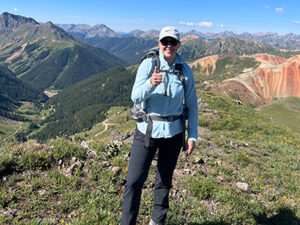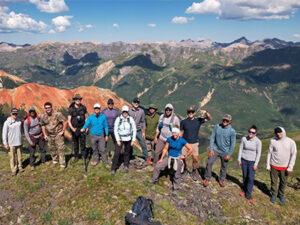By Erin Procko, as told to Jackie Hilgert
As we sat at the mountain summit, we noticed a storm rumbling toward us. Our group was above the tree line, easy targets for a lightning strike. There would be little time to relish the achievement. My accountability partner and I, mission leaders at the time, were charged with leading everyone down the mountain as quickly as possible without anyone getting hurt. This was only one of a number of challenges I faced during the four-day Alpine Crucible led by Jan Rutherford, which I joined in 2022.

I met Rutherford through his work with Bell Bank. He’s an ex-Green Beret turned executive coach, author, speaker and business leader who has done some sales training and coaching with our teams. I got to know him well over the years and he encouraged me to join the Crucible, where business leaders are paired with transitioning military leaders with the goal of each learning from the other while facing an intense challenge. I decided I should take the risk and do it.
Becoming a better leader is really important to me because of the impact my leadership has on the organization and on the people who work in the departments I lead. I care a lot about people, am passionate about building strong teams and making sure I show up every day in the best way to help drive results; it’s something I take seriously.
The digital detox that went along with the Crucible was appealing too, as well as the physical challenge of being on a mountain and doing something I’d never done before. I knew that I would be out of my comfort zone and that’s usually where we grow.
It was fun to learn about the best choices for clothing, how to pack your backpack efficiently, and what the lightest material supplies to use were. The goal was to have enough food and water, to be warm, and still have the pack be light enough to carry. (I later learned that you cannot be full, warm and carry a light pack. One of the three usually gives.)
I knew the climb would be hard. I did some training at home, tried to walk some hills in Minnesota with weights in my backpack. I tried to be in good shape. But I really had no idea what was waiting for me. Even training with weights in my backpack wasn’t the same as putting 40 pounds on your back and walking for hours and hours. You can’t replicate the steepness of the mountains, so anything I did to prepare in Minnesota didn’t help as much as I thought.
My pack was too heavy, for one thing. I had wanted to have enough clothing, water and food. If I were to do it again, I would have packed much less food. I had altitude sickness so I ate very little for the first two days.
The other thing you can’t prepare for is the weather. One day we experienced rain and hail. Nobody voluntarily goes out hiking on a rainy day. On the mountain, there’s no waiting out storms.
We climbed under the “leave no trace” ethic, which means you have to carry out any and all waste you produce. Everything!
I went to Colorado early to adjust to the altitude. I met the group in the town of Ouray, (Elev. 7,792 ft.), at a coffee shop. It was early; the shop hadn’t even opened. Rutherford went over what to expect, explained ground rules like how to treat each other, and laid out what he hoped each of us would get out of the experience. We were assigned an accountability partner, someone with whom we needed to keep an eye on and check in with during our expedition. Then we went rock climbing in Ouray, REI style, but on an actual rock.
Our first challenge was to belay our partner as they climbed up the rock. Their sole safety depended on you maneuvering the rope below. You had to really watch them, giving more or less rope. If you looked away even for a second, your partner was at risk. So the first exercise was to get comfortable with your partner. After that, we drove to the trailhead and started hiking on the expedition. It was about four miles up to our base camp (Elev. 11,000 ft.).
The next morning, we were up at 5:30 in order to leave camp by 7. You needed a lot of time to get ready. In order to eat or drink, you had to go to the stream to get water (the heaviest thing you carry), then filter and boil it. We each carried a tiny stove on which to cook our meals and coffee.
It took about five or six hours of hiking for us to reach our first summit (Elev. 13,500 ft.). The veterans we climbed with introduced the military concept of “after action reviews,” where you discussed what went well and what didn’t. They were very direct with their feedback because for them, leadership skills carry life-and-death consequences.
What hadn’t gone well for me that day was altitude sickness. I became nauseated and felt like I was having an asthma attack. I had to stay calm. Some people offered me tips on breathing, and our leaders that day decided we should take more breaks. One of the military leaders carried one of my water bottles so my pack was a little lighter, which helped. I was able to bounce back strongly with the help of the team.
When we reached the summit that day, the military leader who carried my water said his favorite part of the day was when I let him help me. One thing I’m guilty of is never asking for help. I learned that people really enjoy helping. As a leader who might need help, know there are probably people on your team who would enjoy helping. Or vice versa. If my boss needed it, I would love to help.
One of the other business leaders said he was glad I spoke up about needing to slow down because he was struggling keeping up, but didn’t want to say anything. Nobody wants to be the person who slows down the team. His admission made me realize that sometimes we’re going too fast and don’t realize the people we lead won’t speak up for themselves. I know now to be sure to check in with my team, especially in times of uncertainty.
Our second summit on the third day (Elev. 13,000 ft.) was the day we faced the threat from lightning and needed to get below the tree line quickly. Descending the mountain goes faster than hiking, but it’s far more dangerous. If someone had gotten injured as we descended, it would have slowed us down quite a bit.
That experience, all of it really, reminded me to focus on the things I can control because there’s so much you cannot control, like terrain, weather, illness or injury. Adaptability is key.
At our bank now, we are talking to our teams about how we can’t control the interest rate environment or what’s going on with the economy. All we can control is how we are working with our customers, how we are communicating, and how we are working as a team. I can relate it to being out on the mountain.
At one point, we were instructed to go off by ourselves for a couple hours, not talking to anyone. We were supposed to think and reflect. I sat by one of the streams and enjoyed listening to the water and taking in the landscape. The flowers were in bloom at the time. I could really think clearly. In business we don’t do that enough. We would have a lot more clarity if we just went out for a walk in the woods without our phones. 
It’s easy in our day-to-day lives to get caught up in the messages, the phone calls, the social media, whatever. We’re not really having a lot of white space, and that was one of the purposes of the trip. Business leaders need that digital detox.
For me, a big take-away from this expedition was about getting comfortable taking risks. I definitely play it safe more. I mean, I’m a banker. My job is to manage risk. This expedition taught me I can take more risks and be bolder. In some ways, it’s come in really handy this year. Because there are a lot of risks this year.
Rutherford told us that when you have nothing to prove, promote or protect, you can really be vulnerable and learn from one another. I talked about that with my team when I came back, asking them to think about how much greater our organization could be if we came to work with nothing to prove, protect or promote. It’s tough because that’s not how business usually works, but out on the mountain with strangers, it worked as we learned to be a very strong team together in just four days.
I absolutely loved the mountain landscape and felt grateful for the time I got to spend with the amazingly courageous and selfless military leaders. It was very peaceful and I was amazed at the clarity I gained when I was there in all that open space. I don’t want to climb that mountain again, but I could see myself taking another backpacking trip. Just not one as extreme.
